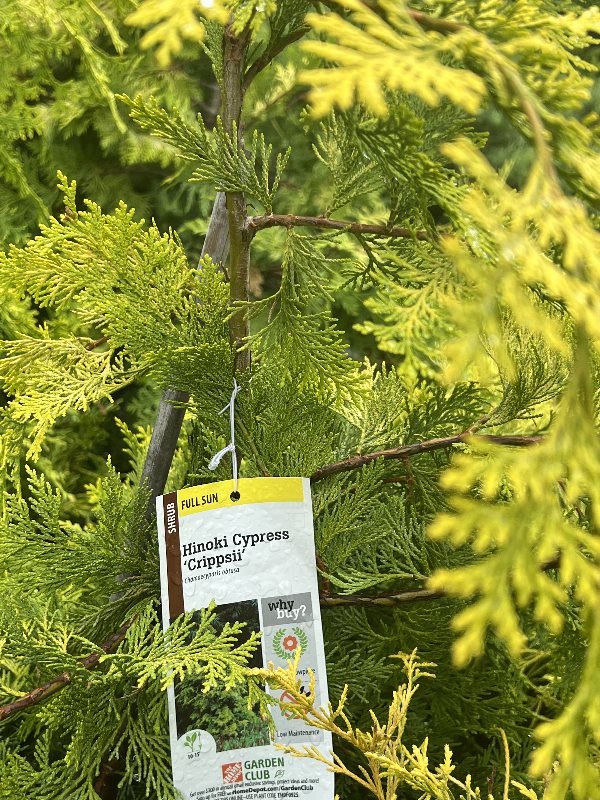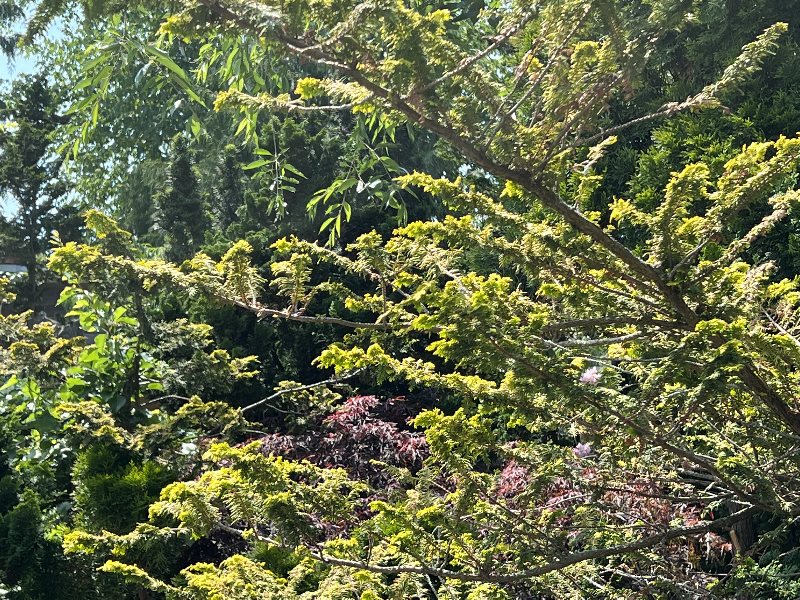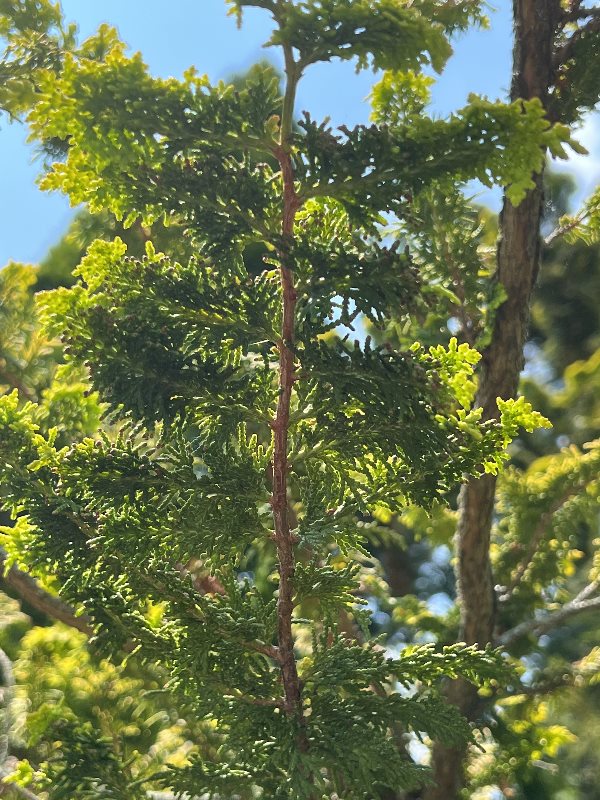
Ashley Davidoff TheCommonVein.net Our Garden
Golden Hinoki Cypress ‘Crippsii,’ also known as Chamaecyparis obtusa ‘Crippsii’ or Hinoki Cypress ‘Crippsii,’ is a cultivar of the Hinoki Cypress (Chamaecyparis obtusa) species. It is highly regarded for its striking golden-yellow foliage, which adds vibrant color and visual interest to landscapes. Here are some key features of the Golden Hinoki Cypress ‘Crippsii’:
- Foliage: The standout characteristic of ‘Crippsii’ is its golden-yellow foliage. The leaves are scale-like and arranged in flattened sprays, similar to the species. However, instead of the typical dark green color of Hinoki Cypress, ‘Crippsii’ displays a vibrant golden hue that intensifies in full sun.
- Growth Habit and Size: ‘Crippsii’ has a slow to moderate growth rate and develops a dense, pyramidal or conical shape. It can reach a height of around 8 to 12 feet (2.4 to 3.7 meters) with a spread of 6 to 8 feet (1.8 to 2.4 meters) over several years. Its compact size makes it suitable for smaller gardens or containers.
- Cold Hardiness: Like the Hinoki Cypress species, ‘Crippsii’ is hardy in USDA hardiness zones 5 to 8. It can tolerate cold temperatures down to -20°F (-29°C) with proper care.
- Light and Soil Requirements: ‘Crippsii’ thrives in partial shade to full sun conditions. In full sun, the golden color of its foliage is more pronounced. It prefers well-drained, slightly acidic to neutral soil but can tolerate a range of soil types.
- Uses: Golden Hinoki Cypress ‘Crippsii’ is commonly used as an ornamental shrub in gardens and landscapes. Its vibrant golden-yellow foliage serves as a focal point or adds contrast when planted alongside other plants with different foliage colors.
- Maintenance: ‘Crippsii’ is relatively low-maintenance once established. It requires regular watering during the establishment period but becomes more drought-tolerant over time. Pruning is generally not necessary unless you want to shape the plant or remove any dead or damaged branches.
When planting Golden Hinoki Cypress ‘Crippsii,’ it is essential to provide adequate spacing to accommodate its mature size and allow good air circulation. Mulching around the base of the plant helps retain moisture and suppress weeds. Regular monitoring for pests, such as spider mites, is recommended, although ‘Crippsii’ is generally resistant to most common pests and diseases.
With its vibrant golden-yellow foliage, Golden Hinoki Cypress ‘Crippsii’ adds a unique and eye-catching element to landscapes, providing a beautiful and colorful addition to gardens and other outdoor spaces.

Chamaecyparis obtusa ‘Gold Fern’
Ashley Davidoff TheCommonVein.net Our Garden’

Chamaecyparis obtusa ‘Gold Fern’
Ashley Davidoff TheCommonVein.net Our Garden’
Chamaecyparis obtusa ‘Gold Fern’ is a specific cultivar of the Hinoki Falsecypress, a beautiful evergreen coniferous tree native to Japan. It is known for its striking golden foliage and compact growth habit. Here’s some information about Chamaecyparis obtusa ‘Gold Fern’:
- Appearance: ‘Gold Fern’ has vibrant golden-yellow foliage that stands out in the landscape. The foliage consists of flattened sprays of scale-like leaves that have a fern-like appearance. The leaves are soft to the touch and emit a pleasant fragrance when crushed. This cultivar maintains its golden color throughout the year, adding visual interest to the garden.
- Size: ‘Gold Fern’ typically grows as a small to medium-sized tree, reaching a height of 10 to 20 feet (3 to 6 meters) with a spread of 6 to 8 feet (1.8 to 2.4 meters) over time. It has a compact, pyramidal growth habit, making it suitable for smaller gardens or as a specimen plant in larger landscapes.
- Growing Conditions: ‘Gold Fern’ thrives in full sun to partial shade conditions. It prefers well-draining soil that is kept evenly moist but not waterlogged. It is generally hardy in USDA hardiness zones 4 to 8, although specific regional variations may apply. This cultivar has good resistance to deer and is considered relatively low-maintenance.
Chamaecyparis obtusa ‘Gold Fern’ is a stunning cultivar of the Hinoki Falsecypress that brings a touch of golden elegance to any landscape. Its compact size, attractive foliage, and low-maintenance nature make it a popular choice among gardeners and landscape designers.
